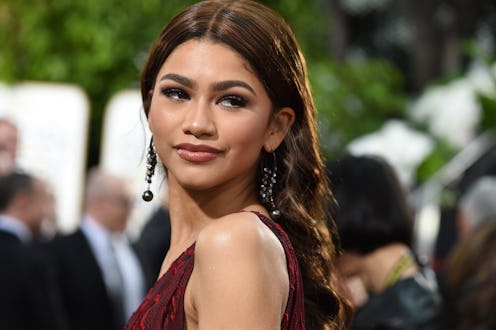Entertainment
Why Did Zendaya Collaborate With Chris Brown?
I genuinely believe that Zendaya is one of the best role models out there to date. She is not only extremely talented in every form of her craft (triple threat status right here), she has a strong sense of self and a poised maturity that goes well beyond her 19 years — an eloquence that is frequently reflected in her views on feminism, sexism, and misogyny. Which is why I was so surprised to learn of "Something New," Zendaya's collaboration with Chris Brown.
Don't get me wrong: The track is a banger with a sample of some old-school TLC that will probably be stuck in my head for a while. But having Brown on the song — a talented performer in his own right, but a man mostly known for his 2009 domestic assault against Rihanna and his violent altercations since — seems off to me. To be blunt, collaborating with a known abuser seems hypocritical given Zendaya's feminist background, and it's a tough one to reconcile in my mind. Bustle has reached out to Zendaya for comment on the decision, but has not yet heard back.
Over the summer, for example, Zendaya shut down sexist Internet trolls for their misogynistic comments about women looking unattractive without makeup. Why then would she choose to collaborate with someone who has done something much worse? There could be the argument that Brown has changed, but as recent as January of this year he allegedly assaulted a woman. Brown denied the allegations in a video in which he repeatedly refers to the woman as a "bitch" and describes her as "ugly."
Unfortunately, the most likely explanation for Zendaya's collaboration with Brown is that he is a big name with a loyal fan base and would help propel the track. There's also the fact that Brown is a talented singer, which leads to the complicated, thorny issue of whether people should still like artists for their music, regardless of their personal behavior. (Depending on where Zendaya sides on this topic, this could also be an explanation for the collab.) But is this reasoning good enough?
To be fair, Zendaya is far from the first woman to work with someone known for his abusive, or allegedly abusive, behavior. Take, for example, the ill-fated Lady Gaga and R. Kelly music video for "Do What U Want," which was pulled because, as Jezebel put it, "Lady Gaga and R. Kelly's Scrapped Video Was Literally 'An Ad For Rape.'" As was well-known at the time that the music video was set to drop, R. Kelly (as well as Terry Richardson, who shot the music vid) has a long history of sexual abuse allegations against him.
Looking back on the video in 2016, it seems unimaginable that Gaga, who herself is a survivor of rape, would voluntarily choose to work with these men. (Six months after the video was pulled, Vogue, W, and T magazines announced they would no longer be working with Richardson after numerous models alleged that they were sexually abused by the famed photographer.) Let me be clear: The blame should clearly rest on the abuser, but it is certainly confusing when artists who are feminists choose to work with those who have a history of allegedly abusing women.
For the record, months before the Lady Gaga video was release, in March 2014, Richardson denied the accusations against him in a Huffington Post essay, calling the sexual abuse claims "vicious and distorted" and "nothing more than an emotionally-charged witch hunt." In 2008, R. Kelly was found not guilty of 14 counts of videotaping himself having sex with an underage girl. And during a 2015 interview with HuffPo Live when asked about the sexual abuse allegations against him, he said, "I did not come here to be interrogated. I didn't come here for a deposition."
As for Zendaya's collaboration with Brown, it is a surprising, disappointing, and frankly hypocritical move that could have been avoided if she had chosen to instead work with a different artist. But to entirely fault the 19-year-old singer-actress-dancer for a decision that was most likely not solely hers in the first place (and likely more of a push from her team and record label) would perhaps be unfairly harsh. And as I stated earlier, the blame here rests much more on Brown himself to better his actions and change his behavior, rather than those who opt to work with him. That being said, I strongly believe that it is important to call attention to the disparity in feminist words and not-so-feminist actions.
